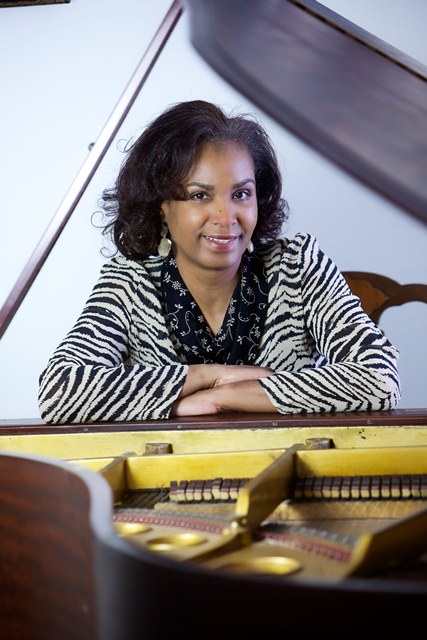by Amy Lynn Smith

There is delicious irony in the fact that a former teacher’s callous, offhand remark helped shape the direction of Taslimah Bey’s career as an educator. Indeed, without that incident, Bey might never have chosen the path she did — and what a loss that would have been to the world of music and the students she inspires today.
Bey, MA ’08, also known by her given name, Patricia A. Hall, is a musician, musicologist and teacher whose passion — some might say cause — is the syncopated, pianobased music known as ragtime, which was popular in the United States during the late 1800s and early 1900s.
She was raised in the Detroit area in a house filled with music, where her grandmother, mother and aunts sang all the time, and where her brother played the piano. Bey was inspired to take up the instrument at age 7, when her brother taught her a four-bar blues tune. She began studying piano in earnest when she was 16. After learning to play Scott Joplin’s ragtime standard, “The Entertainer,” Bey says that she fell in love with the musical form. But, much like the greats of ragtime’s heyday, it may have been adversity that motivated Bey the most.
Studying music history as an undergraduate in Detroit, she asked her professor why 20th-century African-American composers weren’t part of the curriculum. His dismissive response was that black people couldn’t read or write in the early part of the 20th century, let alone read music. The
remark stung and troubled her. “As a young person, that hurt me so much,” Bey remembers. “I thought about my aunt, who earned a college music degree in 1923, and my grandmother, who was incredibly intelligent. And I knew what the teacher had told me was untrue.” Then she thought about the other students — and the generations of students after that — who might simply accept this “wisdom” as fact. “What if they heard that and didn’t have the upbringing I had?” she says. “I was determined to prove people like my teacher wrong.”
Bey spent the next year hunkered down at the Detroit Public Library, reviewing the music and archives in the E. Azalia Hackley Collection of Negro Music, Dance and Drama. The knowledge she acquired strengthened her respect both for the composers and their compositions. Yet, from the outset, Bey felt the ragtime music deep in her heart. “To me, it’s like coming home,” she explains. “It reminds me of being at my grandmother’s house and her frying corn and cooking biscuits.”
Bey says she was also drawn in by the complexity of ragtime, which is rooted in a march-like structure but also demonstrates the emotional depth of the composers, whose lives were typically plagued by hardship. “Think about the ‘Maple Leaf Rag,’ which people all over the world recognize,” she says. “It starts up-tempo but then goes into a melancholy section, which almost every ragtime piece has, and then ends with a feeling of triumph. I was amazed that all those feelings could be put into one piece of music.”
Urged on by fellow musicians, Bey visited New Orleans — one of the cities credited with originating ragtime — to play with the locals. “Not only did I hear New Orleans music, I got to experience it firsthand,” she explains. “A sheet of paper can’t give you the feel of the music. That has to be handed down, like it was in my family.” Through that oral — and aural — tradition, these New Orleans musicians served as teachers, complementing the college studies to which Bey, by then, had returned. She earned a bachelor’s degree in music education from Wayne State University in 1995 and began teaching music.
Bey went on to earn a master’s degree from Oakland University. “Everything I learned at Oakland applied to what I was doing in the classroom and helped me become a better teacher,” she says. Today, Bey teaches middle school music at Law Academy, a K-8 school in Detroit. She is currently working on her doctoral dissertation at OU. During the summer, she tours with her own ragtime band, the Taslimah Bey Quartet, and sometimes gives lectures on ragtime music. In all these ways, she’s teaching people about what she considers American classical music. “Ragtime is distinctly American — and not just African-American, because white classical musicians in New Orleans would play with the black musicians after hours,” says Bey. “So it’s distinctly American because it shows what we can do when we all work together.”
And, just like the early ragtime composers who persevered despite adversity, Bey turned her bad classroom experience into a triumph. “I thought, ‘When I become a teacher I’m not going to give my students limits,’” says Bey. “Without limits, anything is possible.” Read more about
Taslimah on her website.

 There is delicious irony in the fact that a former teacher’s callous, offhand remark helped shape the direction of Taslimah Bey’s career as an educator. Indeed, without that incident, Bey might never have chosen the path she did — and what a loss that would have been to the world of music and the students she inspires today.
There is delicious irony in the fact that a former teacher’s callous, offhand remark helped shape the direction of Taslimah Bey’s career as an educator. Indeed, without that incident, Bey might never have chosen the path she did — and what a loss that would have been to the world of music and the students she inspires today.